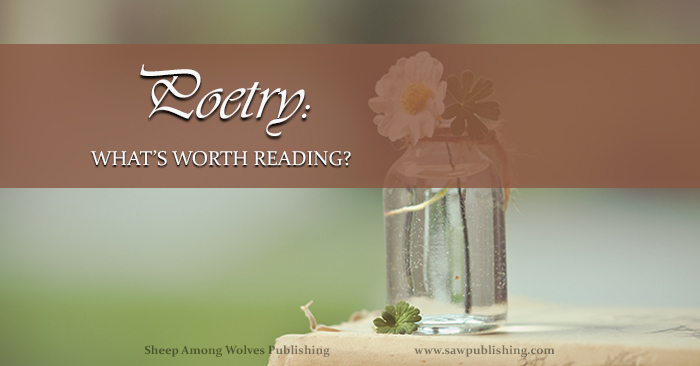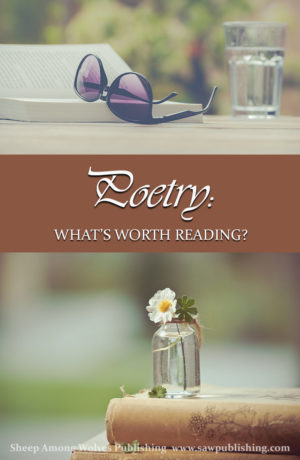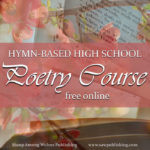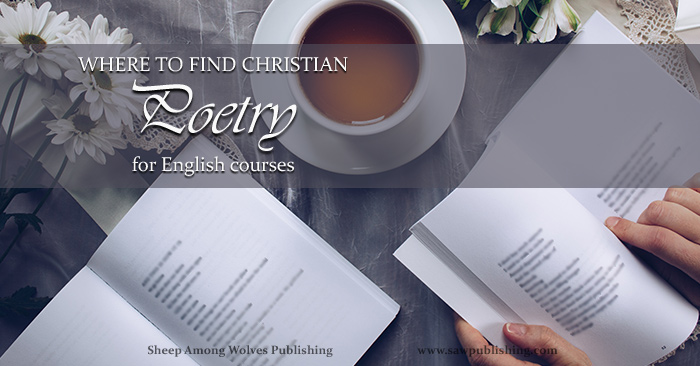Poetry: What’s Worth Reading?
 What’s worth reading?
What’s worth reading?
If you’re like me, when you saw this title, you immediately heard, “What’s NOT worth reading?” Of course, that’s not the title. Somewhere, deep down in my subconscious intuition, some vague instinct probably told me—on the exciting day when I got to invent the title for today’s post—that very few people actually want to read about something I’ve already decided is NOT worth doing.
But I was still planning to write about basically the same thing. I was going to say, “There’s a lot of really worthless poetry out there. There’s a lot of WORSE-THAN-WORTHLESS poetry out there. If you want to read poetry that’s actually going to do you good—MAKE SURE YOU DON’T READ THAT STUFF!” (I was maybe going to use slightly more sophisticated language, but that was what I was planning to aim at.)
Now the one problem with my intended post was just this: it didn’t actually answer the question we started with!
 Poetry: What’s WORTH Reading?
Poetry: What’s WORTH Reading?
I want to look at this question primarily in the context of English courses, although I think the underlying principles hold true wherever poetry is being read. If we are including poetry in our curriculum at all, we are doing it—presumably—because we expect to get value out of it in some way, shape, or form.
We simply do not have enough time in our school day to study anything that is merely neutral. This is where today’s post, as I was originally planning to write it, breaks down. It is not enough for us to know how to identify “harmless” poetry. If we are going to make the most of our limited hours of English curriculum, we will need to be able to recognise the pieces that serve an actively beneficial role.
We aren’t looking for poetry that is “not un-worthy.” We are looking for poems that are absolutely, definitively WORTH the time we are going to spend reading them. So let’s take a look at SAW Publishing’s twin pillars of good and great literature—and why they make the best poems emphatically WORTH including in your homeschooling curriculum.
Why GOOD Poetry is Worth Reading
Good poetry is what we at SAW Publishing would define as poetry that exemplifies spiritual excellence. A good poem is—yes, simple concerning evil—but also wise unto that which is good. (Romans 16:19)
This is the very core of a good poem’s value. Good poetry makes us better people. It is worth reading because of its goodness—and because of the power that goodness will exert over our lives.
Education is primarily about equipping students for their future—their future on this earth and their future eternally. If you have experienced the incredible influence of a godly poem at some time during your own life, then you have first hand experience of why good poetry is WORTH reading.
Why GREAT Poetry is Worth Reading
A great poem—as distinguished from a good one—is a poem that exemplifies literary excellence. The benefits of great poems are twofold.
1) They provide a model of skilled writing for your student to both study and emulate.
2) When coupled with the characteristics of a GOOD poem, they make the godly worldview of their content more compelling.
Students need models of the best writing that the English language can produce. They also need models that will strengthen, rather than weaken, their conception of the power of goodness. Great literature supplies the first of these needs. Good AND great literature supplies the second and provides us with the ultimate example of what’s worth reading when it comes to poetry—or anything else, for that matter!
Take Time to Read the Poetry That’s Worth It!
Poetry isn’t a subject where you are just looking for “inoffensive” or “harmless” content. It isn’t a subject where you can rest satisfied with knowing what’s NOT worth reading. Your student’s educational years are too short—and the power of worthy poetry is too profound—to waste a single moment on poems that aren’t both good and great.
Good and great poems are out there. And they’re WORTH reading!
Are you wondering where to find them? See our previous post:

Do you find your highest aspirations lost in the everyday-ness of life? This FREE poetry download will challenge you to look at your daily world in a new and more beautiful way.

Are you looking for a high school poetry course that will make your student a better person as well as a better poet? What about a course that’s built around classic Christian hymns?

What do you do if your student hates school? As a homeschooling parent, this dilemma can feel like a huge test of your educational ability, but sometimes the answer is a lot simpler than you realized.
- Learning by Doing: Engaging Students in Home Ec
- Mary’s Secret: A FREE Short Story from SAW Publishing

